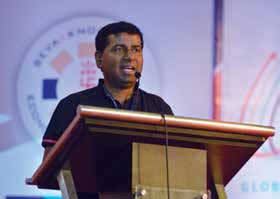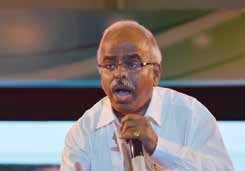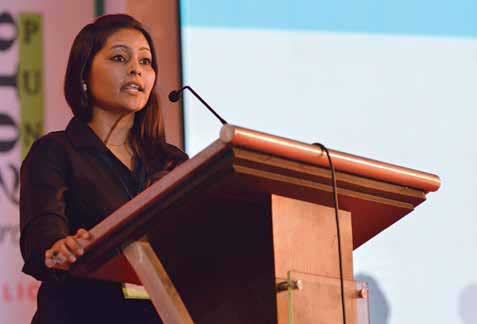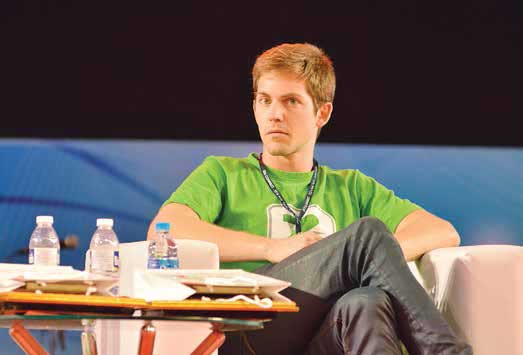
India has become a natural destination for startups-providing basis for innovative entrepreneurs, to launch their disruptive ventures and help change the world. They are being discovered by investors and equally appreciated by customers. Among them who have now turned into seasoned entrepreneurs in this innovation race, were seen speaking about their success stories, their innovative disruption and adaptive strategies, at a recently held global summit “JITO Connect 2016” organised by Jain International Trade Organisation (JITO), in Pune. The big names included Kunal Shah, founder and CEO, FreeCharge; Suhas Gopinath, founder, CEO and chairman, Globals Inc; Greg Moran, co-founder and CEO, Zoomcar; Rupal Yogendra, co-founder and COO, Stayzilla; Rahul Narvekar, founder and CEO, Indianroots and Dr A Velumani, founder and CEO, Thyrocare. Corporate Citizen brings to you the inside story of what these successful entrepreneurs have in common and their meteoric rise, along with their powerful advices.

I am 43 years old and truly believe that I am a very lucky person in life. I am from a generation, which I call as the constant mind-set generation. For us the defining philosophy was always constants. Throughout my childhood and my growing up years, it was a very different economy from what it is today. I come from a very humble background, my father use to work in a factory called Oriental Rubber Tubes, in Bhandup, Mumbai. One fine day the factory just shut down because of labour issues and it never opened again. So, from being a kind of richest family in a Mumbai chawl, we went to become the poorest family in the chawl. I studied in a school called Sardarni Pratap Singh Janata Vidyalaya, in Bhandup.
Luckily, every time I had problem in life, I always would come out much better. For instance, for some reasons the kids in my chawl stopped talking to me and because of that I developed the habit of reading. I would go to the local raddiwala and read all the English magazines, which is why my English speaking was better in the school—which has also helped me a lot, later in my work-life.
I took up many small jobs. My first job was working as a ward boy in Dhanvantari Hospital in Mulund, Mumbai. In the night shift I would mop the hospital floor. I didn’t enjoy it, but it would pay me Rs.1200 per month. That was the first job in my life and I have had an interesting journey, since then. I am born and brought up as a Mumbai boy. I have made door-to-door sales, wrote scripts, produced TV soap operas for very short period, had setup interactive music channel ‘Channel Oxygen” in 1999, in Mumbai.
Thereafter, I moved to Delhi and started again from scratch. In the year 2000, I started working for a company called ANSAL API, a shopping mall in Delhi. Worked for various small companies and then set up Fashion and You. com—in those early days of e-commerce. In fact when I quit my job at DLF Retail Developers and started Fashion and You, the news spread in the market that I have lost my job and I am sitting at home and selling clothes on the Internet. In 2009, when we setup Fashion and You, we were just seven people working and selling high end luxury brands at a discount. In October 2010 we raised funds from an investor and that is the time I suddenly became an entrepreneur. Thereafter we raised more funds but subsequently I exited from Fashion and You. Since January 2013, I am working as the founder CEO of Indianroots, an NDTV ethnic retail venture.
What I have learned? In life or in business, your business plan has some value but execution matters the most. Secondly, don’t get into a business because it looks good at that point of time. Look at what excites you, look at where your passion is. Have jazbat (emotions) and be emotionally attached with your business, that’s the only thing you need today to succeed in the business. With jazbat everything else will come to you, people will chase you to give money, people will help you write business plans. Other thing you need is the ability to stay on. I have done five ventures in life and one thing I have learnt- when you have a plan, you start business and life happens and things don’t go as per plan—have the ability to stay on and change according to market conditions—if you are able to change, adapt and stay on, then you will become successful again and again.

My parents were landless farmers, for whom education was not important. It was a family where there was no income and four children to look after. How to go to school-that was a challenge. I believed in my strength of learning and knew that if one studies they know the true value of life and money.
After my graduation, I failed in 50 job interviews, because everybody was asking for work experience, which I didn’t have. Because I failed in 50 interviews, today in my company I have 750 employees for whom I am the first employer. I finally got a job in a company in Coimbatore, of `150 rupees salary per month. I wanted to collect `1,000 and get married, but fortunately the company closed down. Then I came to Mumbai, because I got a government job, in Bhabha Atomic Research Centre (BARC). I did my MSc and PhD, while working at BARC. But, then I resigned—that time you needed real guts to give up a government job. And I took that decision without deciding with my wife. I thought, if you discuss you just can’t decide.
I invested Rs.2 lakh from my Provident Fund amount to start my own business (Thyrocare)—in return I got Rs.2,000 crore. When I came into this business, I used air cargo, email and barcoding system very effectively. When the entire world was charging Rs.400/500 for one Thyroid Test, I decided to charge only RS.100. This decision also I took by myself and didn’t ask anyone. Subsequently, when I was doing PET Scan, when entire country was charging Rs.25,000, I decided to do it at Rs.10,000 only. You must have courage to take decisions, then only you are successful in business.
I don’t think anybody at that time thought about creating a brand around a gland. The timing of the business was correct. The style in which it was done was right. The courage with which it was launched, was enough. The concept, created an impact. If you want to succeed in life then focus and have stamina, to surpass hurdles.
In my business there is no competition. There are only two kinds of people- one without seeing the competition, is scared of the competition. And the other one says I don’t have competition, it doesn’t exist. You can live in an environment where there is competition—it all depends on how you choose what you want to do. I did numerical pathology, while others did pathology. Others did pathology, I did biochemistry. Others focused on diseases, I focused on disorders. Others focused on sick care, I focused on preventive care. Their patients are in hospital and my patients are in homes and offices. There patients are horizontal and my patients are vertical. I have 99 percent of the market, they have only one percent of the market, because at any given time only one percent of the people are sick. I have no competition and they have competition.
Anyone who is successful, has disrupted something. If one has disrupted two things, then he/she is very powerful. First is price distribution—in business area you can take profits from the customer or you can take profit from the vendor. Many people only take profit from the customer and are unable to take it from the vendor. Squeeze the vendor and spare the customer—it is an honourable business.
When I got into business, all the specimen went by road in the same city. I started using air cargo and first time specimen started flying. My competitors work day time and we work in the night and we are successful. We are present in thousand cities, have 600 staff strength and 98 percent of them are freshers. I started my business in a 200 square feet vintage garage, in 1996. Today I own 2,00,000 sq ft of space, comprising of two plush buildings in Mumbai. So, these are all the disruption I brought. Without disruption you can’t bring in anything new.
One day my daughter asked me-are you very rich and I answered I am. Then she asked-what are you going to do with so much money. That’s when I thought, I will give back to the society. But, my daughter said that I am a fool to loot from the patients and give it to the society. That same day, I brought the test cost down from two dollars to one dollar. Business is all about pricing it low and still making a margin.

I feel success is a very farfetched word. For me this is our journey and we are still embarking on it. Especially our goal has always been to take care of the supply crunch in India of hotel accommodation and living spaces.
Stayzilla is a market place for rooms. What we sell is basically hotel rooms online, but we have also pivoted towards selling home stays in private properties, because of the crunch in supply that we have been seeing recently. We have about 30,000 properties across 4000 cities and towns in India and we have been known for our wide coverage. Stayzilla per say is a platform were people can come and post their empty spaces, rooms, extra house or anything, so that we can sell ‘stays’ to our travellers and guests on short term basis—it is mostly like how we sell hotel rooms. We have rooms in every zilla (district) in India, which is why we call it Stayzilla.
I come from a Marwari Jain family and hailing from a business family it was typical that I would become an entrepreneur someday. But I aspired to become a software engineer. I really wanted to work for a big software company and fly overseas, but it so happened that after I completed my engineering, I did small jobs for six months and then worked in Infosys for a very short while. I was inspired by the story of Narayana Murthy story and Infosys. Then came Yogendra Vasupal (Yogi)in my life-my husband and CEO of the company. Stayzilla was co-founded by Yogi, Sachit Singhi and me—all college friends. Sachit is the CFO of the company. However, we all had gone our own separate ways after our engineering education, but then something happened and we all got together to start Stayzilla. Yogi had approached us to join him to start out an online marketplace for stays.
There are advantages of co-founding business with friends—they will be there to back you during difficult times and see that you don’t give up. Although when you have friends as co-founders of business, you need to make sure that you have very clear professional outlook. Have to allow them to experiment, even when you know that they are wrong—something that we really try hard to do for each other
Yogi has his own interesting story of how he started. He was a college dropout. When Sachit and I were doing our fourth year of engineering, Yogi was freelancing—creating websites for companies and also was an Amazon.com affiliate. He was earning over Rs.one lakh per month, which was big money for youngster to earn back in 2005. But he felt that he was not creating any value and always wanted to do something else, like venture into a potential market.
We came together and started looking through different markets and ideas. Then we came across accommodation and felt that it had lot of potential. It was an unorganised market then and we found it very interesting. So, we just went ahead and in 2005 we co-founded our company Inasra, which was later rebranded to Stayzilla in the year 2010. Yogi created the website and I was responsible for convincing hoteliers and property owners, and bring them on Stayzilla. It needed lot of perseverance—I had very small team of just six people, six mobile phones, working in a small room inside our house. That time hotels were not really willing to come online, so it took a lot of perseverance to bring them on board. But we somehow managed to bring them online, started getting into transactions and got into business.
It so happened that, when customers started checking in, we started receiving complaints. They started calling us that the hotelier has no rooms available and he does not recognise Stayzilla. We realised that hoteliers do not recognise the brand and that’s why they are not holding rooms for our customers. Initially we didn’t have enough funds to go ahead and make a brand. But, we came up with an innovative idea. We started reminding hoteliers that the customers are going to check in, so they would be able to arrange a flash check-in for the customer. This way we started passing customer's preferences to the hotel, before they got there, which has really helped our customers in a big way.
There are advantages of co-founding business with friends—they will be there to back you during difficult times and see that you don’t give up. Although when you have friends as co-founders of business, you need to make sure that you have very clear professional outlook. Have to allow them to experiment, even when we know that they are wrong—something that we really try hard to do for each other.
Another daunting thing for us was to see that our responsibilities are sorted out and get ourselves into the structure, and we did that very smartly. We understand our strengths and weaknesses.

There are few things that I have observed about we Indians. The first thing is that we tend to live lot of our life for other people and not for ourselves. The decisions we take in terms of education or business we do, are usually influenced a lot by what other people think about us. When I started online prepaid recharge business, FreeCharge, things that I heard washow can it be something valuable. But, ultimately market was so huge for us that we had the opportunity of doing it and we were really keen on doing it. I am a 35-year-old, who wanted to create a company from zero to nearly Rs.3000 crore in five year time—it is possible in today’s time.
Second thing is that we have a huge trust deficit problem with each other. We cannot trust each other a lot and that’s a huge problem. Examples of not trusting each other are - when we do a transaction we ask for a Demand Draft but don’t believe in cheque; when we leave our car for servicing we remove all the petrol and hand it over; when we get the bill in a restaurant we check the total ten times, even when the bill computer generated. These are called trust deficit behaviours and there are hundred such things that we do every day—which makes commerce slow and not trustworthy. I think, India has massive opportunity, if it can somehow figure out the way to trust. Branding is a combination of quality product, trustworthy product, reliability, showing and demonstrating trust, and these are few things you have to do in your businesses. If you create a culture where nobody can be trusted, you will not be able to create a brand. Brand happens when you trust first and then expect trust from others later.
In IT companies it is very common for people to take job offers and not join the company. So, what we did in our company—with the offer letter itself we would give them a MacBook laptop.
When we did it first time, our HR person told us, what if they don’t come back—which is a classic Indian behaviour. I said to him that it comes at much cheaper cost to have a person who is so unethical to leave before, than having such a person come inside and then manage the company. It’s an example of how you can create trust by demonstrating trust and how people will then do amazing things for you.
Another thing that I have observed is that we are not very honest with each other when it comes to feedback. It’s a very Indian thing. Anytime somebody wants to start a business, we will ask questions to friends and family—which in my opinion is the worst thing to do. Never ask friends and family-how do you find this idea? Because friends and family will always tell something that will not hurt you. We all don’t mean everything that we say. Honest people will give a frank feedback and those are the people, whom you should be asking question to and not the people who will just morally support you and take you in wrong direction.
Another observation is—in communities how people treat technology. I have seen that in India every house now has a chief technology officer, who is teaching technology to the whole house. He has also become the chief motivator of the house, who is also deciding how to buy things, because he can access technology, do better research, go online and find better prices and so on. I believe that lot of companies and the products they design are not suitable to youth's liking. They find your websites, services, interiors of your shops, not very appealing. You have to appeal to the youngsters now because you are already influencing the family’s purchasing members. These 10-15 year olds are seeing the same trends that teenagers in US and Dubai are seeing. You have to be sure that you are making a product that is global standard and not Indian standard. Indian standard is not a proud thing unfortunately, so far. So, we have to ensure that we create products and services for youth to be proud about.
Last thing I want to say is-India’s favourite sport is not cricket but jumping to conclusions. India love’s to jump to conclusions. There are hundred reasons why we win and hundred reasons why we lose. Don’t jump to conclusions—when you jump to conclusion you will not build a strong insight or strong instinct. People who jump to conclusion usually always fall into their own traps.
India’s favourite sport is not cricket but jumping to conclusions. India love’s to jump to conclusions. There are hundred reasons why we win and hundred reasons why we lose. Don’t jump to conclusions—when you jump to conclusion you will not build a strong insight or strong instinct. People who jump to conclusion usually always fall into their own traps

Entrepreneurship in India is really exciting. I have seen it for so long in US, where Indian entrepreneurs come and venture into businesses and now I am trying to do the reverse as an American, and I am having an absolute blast. I lived as an undergraduate in US and studied international relations and finance. I always knew that market here in India was really exciting, with great opportunities. I had lot of friends from India in those early days.
My career has always been about what I can do for environment—if we look at it from existential perspective, India is a great example. If we are not building businesses in the right way, without thinking about the environment and scaling with the city’s growth, then we are really at a loss and major trouble. I initially had a background working in wind energy and solar energy space, which I thought will bring me opportunities in India. But the challenge was that those businesses in India are very much government regulated top to bottom and very tough to actually build from the ground up. We wanted to do something new scale that was technology enabled and not worry about government—where we could ourselves drive and build. We wanted to tackle some of the problems of transportation in the big cities because we knew that the infrastructural woes really need to be addressed by private sector businesses. One of the idea we settled on was virtual ownership of an asset-in this case the car, a vehicle. We knew that by combining the very low initial rates in really dense cities, we were going to get half the combination. That’s when we thought about starting a self-drive car rental service, which could actually accommodate customer’s needs of travelling without having to own a car. Which would lower consumption, and there is no need to have millions of cars on the road.
When we started in India, we had many challenges in the initial days. First thing is about building a chain and including people in the company. This is so important…you really need to achieve—it is first and foremost and that is really everything. Even at entry level we wanted everyone fully aligned to the mission and vision of the company. One really had to understand, why we are doing what we are doing and why we are building. It is important they are attached to the company mission and vision. I would actually tell them that we are going to go out, we are going to make cities a lot more liveable through our business model. People you hire especially in your early days, have to really tune into the vision and mission. It is not something were you are working in a 9 to 5 job. When you are working in a startup, it’s a 24x7 job. You need to attract people who are ready to put in that extra effort.
The second major point to me that was really valuable is to make sure that the whole team, no matter who it is—whether they are engineers or marketing people, they have to understand the reason why of the business. The importance of understanding ‘why’ is very fundamental because if you don’t know-for example if you are an engineer and you don’t understand what you are coding and building or if you are marketer and you don’t understand the mission, then you are not going to do be very good at your job. It’s something even in our earlier days, we always made sure that everyone in the team understands why we are doing something, what was the business object, what was the business vision. Make sure that people understand the business logic and reasons why, behind something. This for me is the biggest learning.
There are too many touch points with the customer in our business and it’s so fundamental that you have to be in the shoes of the customer day-in day-out. The customers are in many ways, putting all of their trust and life in our hands. When they rent out our cars we have to make sure that everything is completely immaculate and working. As you can imagine the customers are incredibly demanding. No matter what the business, you always have to anticipate the customer’s needs and have to just concentrate on reaching out to your customer and having a continuous feedback from them. What we learnt is that the consumer here, when you show them empathy and consistency, you have a very loyal customer. Having loyal customers is what drives your business and that’s what enables to continue having loyal customers. It is going to reduce your marketing cost and have very positive reinforcement.
We have so many touch points with the customer. The customers are in many ways, putting all their trust and life in our hands. When they rent out our cars we have to make sure that everything is completely immaculate and working. The customers are incredibly demanding. You always have to anticipate the customer’s needs and have to just concentrate on reaching out to your customer and having a continuous feedback

When I started my company at the age of 14 years, I was growing up in a middle class family were entrepreneurship was considered as sin. You can’t walk to your parents and say- “I like to be like Mark Zuckerberg”. The only thing important for my family was that your success is always benchmarked with your academic scores. For them all that mattered was how much will I score in exams. In my school I was an average student in my academics. My school-day friends had access to home computers but I didn’t have one. First time when I went to a cyber café with my brother, I was completely fascinated by the world of the Internet. I felt that with Internet the opportunity is enormous and if I sit at the cyber café, I could explore the world and could have access to all the information and data. That’s exactly when I released that having a ₹15 rs pocket money every month I couldn't afford to surf the net every day at the cyber café. The only way I can do it was to have a deal with the shop owner—I asked him if I could offer to open the shop and take care of the customers, when he shuts down the shop from 1pm to 4 pm for lunch break, in exchange of me using the internet for free He agreed to that and it was my first business deal, with what I started off my entrepreneural journey.
My first lie to my mother was that I have joined National Cadet Corp (NCC) classes in the school and I will always come home late. When I failed in mathematics exam and my teacher informed my mother, her reaction was that it’s not the mistake of her son alone but it’s the mistake of the school because they made him enroll in the NCC classes. That’s when my teacher realised that all this while I was lying to my mother that I joined NCC, when I was actually in the cyber café.
I started off with making websites for American companies. But they didn’t accept me very seriously, because they felt that I was still 14 years old and I didn’t even have a moustache. They were feeling a bit insecure with a school kid who is not so experienced. They started to link my skill sets to my age, which I felt was a very unfair way to access your skills. That’s when I felt that I need a job and the only way is keep sending CVs to these companies for work opportunities. At the same time I felt that to be your own boss, you have to be on the other side and start my own company.
When you ask friends and families you get positive responses and also get some negative responses. My family was completely against, me starting a company. They felt that I am not from business family and didn’t know how business is run-how would I do it. My father was working in Indian Armed Forces as a scientist, so me doing business was least expected. It was extremely hard in those initial days, when you don’t have family support and you are very young. You can’t even open a bank account on your own and for starting a company you are completely dependent on someone like the internet shop owner or somebody in the US. I decided to have a company in US. The only common thing that matters for an entrepreneur sitting here or there in US, is perseverance and fire in the belly. As far as you have the perseverance and you know your vision that this is exactly what you want to execute and stay simply focused, you can easily achieve what you want. I built my own portal, www.coolhindustan. com, at the age of 14 years. I incorporated my company Globals Inc., the same year.
The only common thing that matters for an entrepreneur sitting here or there in US, is perseverance and fire in the belly. As far as you have the perseverance and you know your vision that this is exactly what you want to execute and stay simply focused, you can easily achieve what you want. I built my own portal, www. coolhindustan.com, at the age of 14 years. I incorporated my company Globals Inc., the same year
I always realised that organisations need to innovate, when they are at the peak of their success. I have seen most organisations when they have already failed, they want to do the shift. When you are already on the shift and your engine is not working, it is very hard to pivot your direction. It’s more important when you are at saturation point and you are offering an industry that’s disruptive, to pivot. I would like to highlight that there is abundant amount of capital that’s available, only thing that matters is a strong idea and fire in the belly to execute that idea. If you can’t believe in your idea, you can’t execute the idea.
By Rajesh Rao